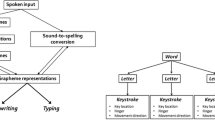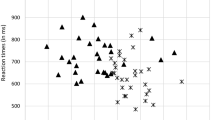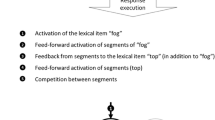Abstract
The study of typing comprises a fascinating mixture of elements from motor skills, typewriter mechanics, anatomy, and cognitive control structures. Our research group initially started to study typing because it seemed an ideal example of highly skilled performance, with readily available experimental subjects and, with the advent of computer-controlled keyboards, a possibility of collecting large amounts of response time data. We expected the topic to be interesting, but were unprepared for the complexity of the phenomenon. Typing brings together many different functions, some of them heretofore ignored in cognitive psychology, yet that are of critical importance in understanding human performance. In particular, some of the problems of typing force us to confront issues of the control structures involved in highly skilled parallel-output performance, as well as questions relating to the representation of skilled motor acts within the human memory and motor control systems, all of which apply to a much more general range of concerns than typing.
Access this chapter
Tax calculation will be finalised at checkout
Purchases are for personal use only
Preview
Unable to display preview. Download preview PDF.
Similar content being viewed by others
References
Reference Notes
Gentner, D. R., Grudin, J., & Conway, E. Finger movements in transcription typing (Tech. Rep. 8001). La Jolla, Calif.: University of California at San Diego, Center for Human Information Processing, May 1980.
Gentner, D. R. Skilled finger movements in typing (Tech. Rep. 104). La Jolla, California: University of California at San Diego, Center for Human Information Processing, July 1981.
Grudin, J. T. Central control of timing in skilled typing (Tech. Rep. 8202). La Jolla, Calif.: University of California at San Diego, Center for Human Information Processing, 1982.
References
Beeching, W. A. Century of the typewriter. New York: St. Martin’s Press, 1974.
Card, S., Moran, T., & Newell, A. Applied information-processing psychology: The human-computer interface. Hillsdale, N.J.: Erlbaum, in press.
Dvorak, A. There is a better typewriter keyboard. National Business Education Quarterly, 1943, 11, 58 - 66.
Dvorak, A., Merrick, N. L., Dealey, W. L., & Ford, G.C. Typewriting behavior. New York: American Book Company, 1936.
Gentner, D. R. Evidence against a central control model of timing in typing. Journal of Experimental Psychology: Human Perception and Performance,1982, in press.
Grudin, J. T. The organization of serial order in typing. Unpublished doctoral dissertation, Universtiy of California at San Diego, 1981.
Head, H. Aphasia and kindred disorders of speech (Vol. 1 ) New York and London: Cambridge University Press, 1926.
Lashley, K. S. The problem of serial order in behavior. In L. A. Jeffress (Ed.), Cerebral mechanisms in behavior. New York: Wiley, 1951.
Long, J. Visual feedback and skilled keying: Differential effects of masking the printed copy and the keyboard. Ergonomics, 1976, 19, 93 - 110.
Norman, D. A., & Fisher, D. Why alphabetic keyboards are not easy to use: Keyboard layout doesn’t much matter. Human Factors,in press.
Ostry, D. J. Execution-time movement control. In G. E. Stelmach & J. Requin (Eds.), Tutorials in motor behavior. Amsterdam: North-Holland, 1980.
Rumelhart, D. E., & Norman, D. A. An activation-trigger-schema model for the simulation of skilled typing. Proceedings of the Berkeley Conference of the Cognitive Science Society. Berkeley, Calif. 1981.
Rumelhart, D. E., & Norman, D. A. Simulating a skilled typist: A study of skilled cognitive-motor performance. Cognitive Science, 1982, 6, 1 - 36.
Schmidt, R. A. The schema as a solution to some persistent problems in motor learning theory. In G. E. Stelmach (Ed.), Motor control: Issues and trends. New York: Academic Press, 1976.
Shaffer, L. H. Latency mechanisms in transcription. In S. Kornblum (Ed.), Attention and performance IV. New York: Academic Press, 1973.
Shaffer, L. H. Intention and performance. Psychological Review, 1976, 83, 375 - 393.
Sternberg, S., Monsell, S., Knoll, R. L., & Wright, C. E. The latency and duration of rapid movement sequences: Comparisons of speech and typewriting. In G. E. Stelmach (Ed.), Information processing in motor control and learning. New York: Academic Press, 1978.
Terzuolo, C. A., & Viviani, P. The central representation of learned motor patterns. In R. E. Talbott & D. R. Humphrey (Eds.), Posture and movement. New York: Raven Press, 1979.
Terzuolo, C. A., & Viviani, P. Determinants and characteristics of motor patterns used for typing. Neuroscience, 1980, 5, 1085 - 1103.
Editor information
Editors and Affiliations
Rights and permissions
Copyright information
© 1983 Springer-Verlag New York Inc.
About this chapter
Cite this chapter
Norman, D.A., Rumelhart, D.E. (1983). Studies of Typing from the LNR Research Group. In: Cooper, W.E. (eds) Cognitive Aspects of Skilled Typewriting. Springer, New York, NY. https://doi.org/10.1007/978-1-4612-5470-6_3
Download citation
DOI: https://doi.org/10.1007/978-1-4612-5470-6_3
Publisher Name: Springer, New York, NY
Print ISBN: 978-1-4612-5472-0
Online ISBN: 978-1-4612-5470-6
eBook Packages: Springer Book Archive




